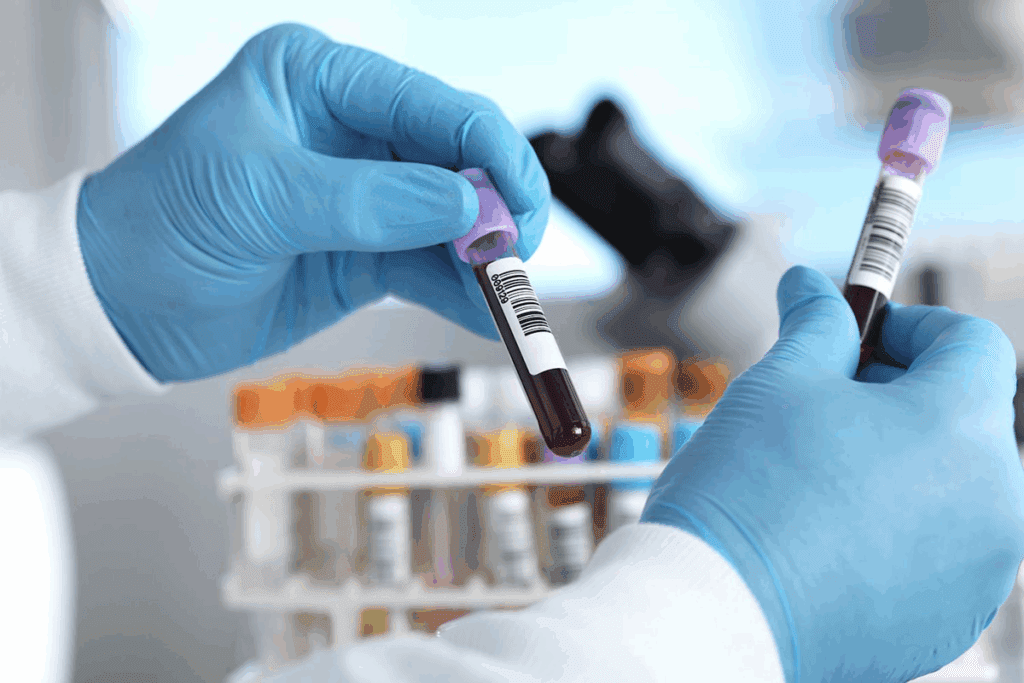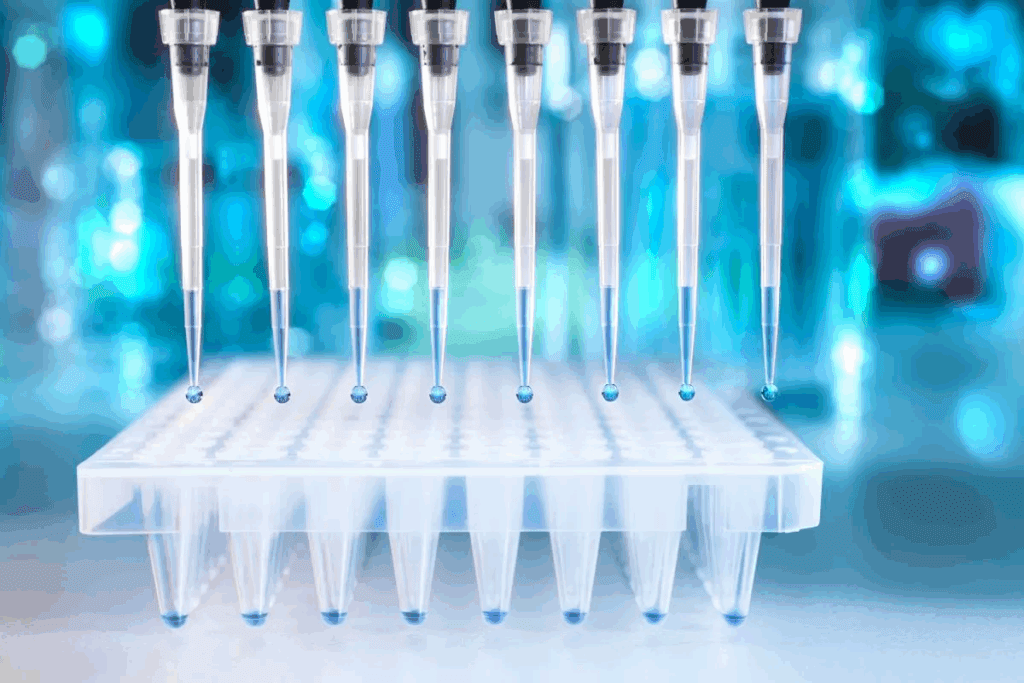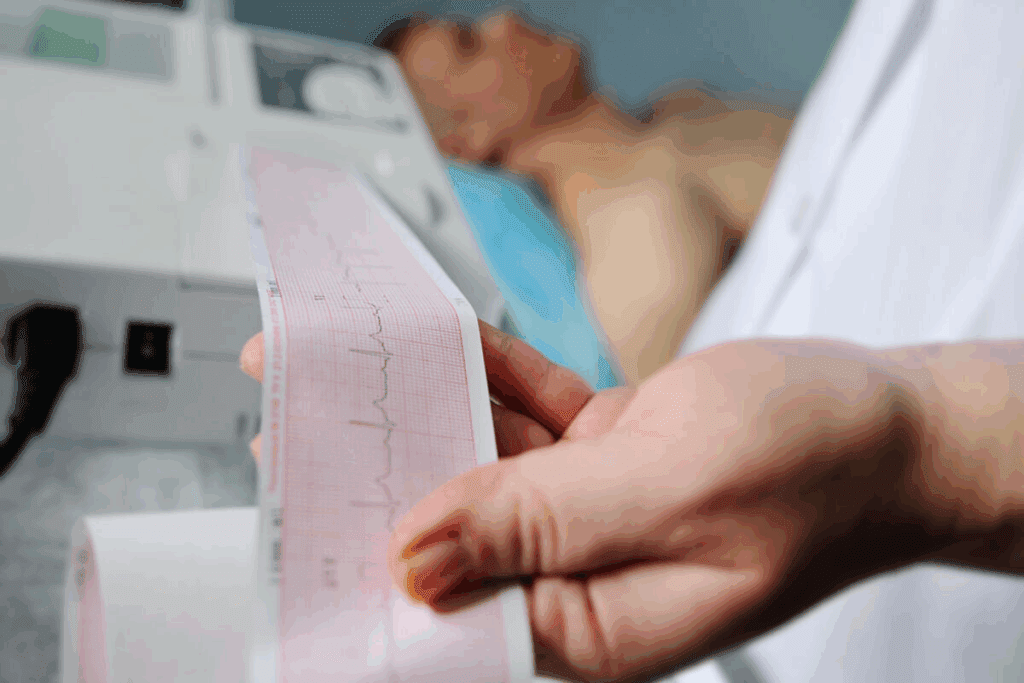
Test for Heart Failure: What You Should Know
Nearly 1 in 5 adults in the United States has heart disease, and many cases go undetected until a serious event occurs, such as a heart attack. Blood tests play a vital role in identifying and managing heart conditions by detecting early signs of damage or stress on the heart.
When it comes to a test for heart failure, doctors often use specific blood tests to measure markers that show how well the heart is functioning. These tests can reveal heart strain or damage long before symptoms become severe. Understanding the different types of heart tests — and what their results mean — is essential for maintaining good heart health.
At Liv Hospital, our expert cardiology team uses advanced diagnostic tools to detect heart issues early and provide personalized treatment for every patient.
Key Takeaways
- Blood tests can show heart problems before they get worse.
- There are many tests to check heart health.
- It’s important to know about different heart tests and what they mean.
- Blood tests are a big help in diagnosing heart attacks.
- Finding heart problems early can really help patients.
The Role of Blood Tests in Cardiac Evaluation
Blood tests are key in checking heart health. They give important info about the heart’s state. This helps doctors diagnose and treat heart diseases well.
How Blood Tests Complement Other Cardiac Diagnostics
Blood tests work with other tools, like imaging tests, to fully understand heart health. For example, an echocardiogram or MRI shows the heart’s shape and how it works. But blood tests can find signs of heart damage or stress.
Key benefits of combining blood tests with other diagnostics include:
- Enhanced diagnostic accuracy
- Better risk stratification for patients
- More personalized treatment plans
| Diagnostic Tool | Primary Use | Complementary Information |
| Blood Tests | Detect biomarkers for heart damage | Provides insight into heart health and possible underlying conditions |
| Echocardiogram | Assess heart structure and function | Shows heart chambers, valves, and blood vessels |
| Stress Test | Evaluate heart function under stress | Finds possible coronary artery disease or other heart issues |
Limitations of Blood Testing for Heart Conditions
Blood tests are very useful for heart checks, but have limits. They might not catch all heart problems. Also, some results can be affected by other health issues, like kidney problems or other diseases.
It’s important to look at blood test results with the whole picture of a patient’s health.
Understanding Heart Disease Biomarkers

It’s key to know about cardiac biomarkers to spot heart damage and related health problems. These biomarkers are substances in the blood that show up when the heart is damaged. They are vital signs of heart health.
What Are Cardiac Biomarkers?
Cardiac biomarkers are proteins or enzymes in the blood. They show how much heart damage there is. The main cardiac markers test includes troponin, creatine kinase (CK-MB), and myoglobin. These markers are key to diagnosing heart issues, like heart attacks.
The use of heart attack blood markers is common in emergency rooms. It helps doctors quickly find and treat heart problems. These biomarkers help doctors see how bad the heart damage is and what treatment is best.
How Biomarkers Indicate Heart Damage
When the heart gets hurt, like in a heart attack, special enzymes and proteins leak into the blood. The levels of these heart attack blood indicators can be checked in blood tests. This gives important information on how much heart damage there is.
- Troponin levels are very telling, as high troponin levels mean heart muscle damage.
- Creatine kinase (CK-MB) shows heart muscle damage too.
- Myoglobin is an early sign of heart damage, as it gets into the blood right after a heart attack.
Doctors use these biomarkers for heart disease to diagnose heart problems better and plan treatments. Quick tests for cardiac biomarkers are key in managing heart disease and stopping more heart problems.
Cardiac Enzyme Tests: The Basics
The cardiac enzyme test is a blood test. It checks the levels of certain enzymes in the blood. These enzymes are released when the heart muscle is damaged.
What Are Cardiac Enzymes?
Cardiac enzymes, also known as cardiac biomarkers, are proteins found in heart muscle cells. When the heart is damaged, these enzymes leak into the bloodstream. They can then be detected.
The most common cardiac enzymes include troponin, creatine kinase (CK-MB), and myoglobin. Troponin is very specific and sensitive to heart damage. It shows up in the blood a few hours after a heart attack and stays high for days.
“Troponin is the preferred biomarker for diagnosing acute myocardial infarction due to its high sensitivity and specificity.”
American Heart Association
When Cardiac Enzyme Tests Are Ordered
These tests are ordered when someone shows symptoms of a heart attack. Symptoms include chest pain, shortness of breath, or dizziness. The tests help find heart damage and how bad it is.
| Enzyme | Rises After Heart Attack | Peaks | Returns to Normal |
| Troponin | 2-3 hours | 24-48 hours | 5-14 days |
| CK-MB | 3-6 hours | 12-24 hours | 48-72 hours |
| Myoglobin | 1-3 hours | 4-12 hours | 24 hours |
Knowing when cardiac enzyme levels rise is key. It helps doctors diagnose and manage heart conditions well.
Troponin: The Gold Standard Test for Heart Attack

Troponin is now the top test for diagnosing heart attacks. It has changed how we care for the heart. This protein is in heart muscle cells. When the heart gets damaged, troponin gets into the blood, showing heart injury clearly.
Understanding Troponin Levels
A blood test measures troponin levels. It can spot even small heart damage. The test looks for troponin T or I in the blood. High troponin levels mean heart damage, with higher levels showing more damage.
“Elevated troponin levels are a red flag for cardiac events,” a cardiologist a. “It’s a critical tool in diagnosing heart attacks and assessing the risk of future cardiac events.”
High-Sensitivity Troponin Testing
High-sensitivity troponin testing is a big step forward in heart care. It can find troponin at very low levels, helping diagnose heart attacks early. This test is great for checking if heart attacks are likely in patients with low to moderate risk.
Interpreting Troponin Lab Test Results
Understanding troponin test results needs careful thought. High troponin levels mean heart damage, but they can also show other issues like heart failure. So, troponin results must be looked at with symptoms, ECGs, and other tests.
Troponin testing is key in diagnosing heart attacks. Knowing about troponin levels and high-sensitivity testing helps doctors make better care plans.
Key Points to Remember:
- Troponin is a protein released into the bloodstream when heart damage occurs.
- Elevated troponin levels indicate heart damage, with higher levels suggesting more severe damage.
- High-sensitivity troponin testing allows for earlier diagnosis and is useful in ruling out heart attacks.
- Troponin results must be interpreted in the context of clinical symptoms and other diagnostic findings.
BNP and NT-proBNP: Key Tests for Heart Failure
Tests for BNP and NT-proBNP have greatly improved heart failure diagnosis. These tests look for specific biomarkers in the blood linked to heart failure.
What Blood Test BNP Measures
BNP, or Brain Natriuretic Peptide, is a hormone made by the heart’s ventricles when they’re under strain. The BNP blood test checks the hormone’s level. This gives insight into how well the heart is working.
How BNP Helps Diagnose Heart Failure
The BNP test is key for diagnosing heart failure. It helps tell if symptoms are from heart failure or other issues. High BNP levels mean the heart is working too hard, which could signal heart failure.
- BNP levels show how severe heart failure is.
- They help check if treatment for heart failure is working.
- BNP testing also helps figure out the risk for patients with heart failure.
Normal vs. Elevated BNP Levels
It’s important to know the difference between normal and high BNP levels for diagnosis. A BNP level below a certain point (usually around 100 pg/mL) is normal. But levels above this might mean heart failure. Yet, it’s important to look at the patient’s whole situation.
Understanding BNP levels means considering age, kidney function, and other heart issues. Doctors use BNP levels along with other tools to diagnose and manage heart failure.
CK-MB: The Traditional Heart Attack Marker
CK-MB is a key enzyme in diagnosing heart attacks. It’s found in heart muscle cells. When the heart muscle is damaged, CK-MB is released into the blood, helping doctors spot cardiac injury.
How CK-MB Indicates Heart Damage
CK-MB levels in the blood go up a few hours after a heart attack. They peak in 24 hours. This helps doctors see how much heart damage has occurred. Even though newer markers like troponin are more accurate, CK-MB is useful in some cases.
When CK-MB Testing Is Used Today
Troponin is now the top choice for heart attack diagnosis because it’s more sensitive and specific. But CK-MB is useful when troponin levels might be high for reasons other than heart attacks. It’s also good in places where troponin tests are not available.
| Marker | Rises After Heart Attack | Peaks | Returns to Normal |
| CK-MB | 4-6 hours | 24 hours | 48-72 hours |
| Troponin | 2-3 hours | 12-24 hours | 5-14 days |
Knowing how CK-MB and other cardiac markers work is key to accurate diagnosis and treatment. By using CK-MB testing along with other tools, doctors can make better decisions for patient care.
Myoglobin: An Early Indicator of Heart Damage
The myoglobin test is a key tool for spotting heart damage early. It gives vital info for quick medical action. Myoglobin is a protein in muscles, including the heart, released into the blood when muscle cells are damaged.
The Role of Myoglobin in Heart Attack Detection
Myoglobin is one of the first signs in the blood after a heart attack. Its levels can go up a few hours after symptoms start. This makes it a good sign for early diagnosis. The test checks how much myoglobin is in the blood, helping doctors see how much heart damage there is.
Early detection is key because it allows for quick treatment. This can greatly help patients having a heart attack. The myoglobin test is very helpful in emergencies where fast decisions are needed.
Limitations of Myoglobin Testing
Even though myoglobin is an early sign of heart damage, it’s not just for heart attacks. High levels can also mean skeletal muscle damage. So, myoglobin tests are usually used with other cardiac biomarkers, like troponin, for a better diagnosis.
It’s important to look at myoglobin test results in the patient’s whole situation. This includes symptoms, medical history, and other test results. This way, doctors can make the best choices for patient care.
Comprehensive Test for Heart Failure: The Cardiac Panel
The cardiac panel is a key test for heart health. It checks the heart’s structure and function. It’s a group of tests that gives important information.
Components of a Heart Panel Blood Test
A heart panel blood test includes several important parts:
- Troponin levels: to assess heart damage
- BNP or NT-proBNP levels: to diagnose heart failure
- Lipid profiles: to evaluate cholesterol and triglyceride levels
- Electrolyte levels: to check for imbalances that could affect heart function
- Creatinine levels: to assess kidney function, which is closely linked to heart health
When a Cardiac Panel Is Recommended
A cardiac panel is often recommended for patients with heart failure or at high risk. This includes those with heart disease, high blood pressure, or diabetes.
What to Expect During Testing
During a cardiac panel blood test, a healthcare professional will draw a blood sample. It will then be analyzed in a laboratory. The process is quick and straightforward.
It’s important to follow any pre-test instructions. This includes fasting or avoiding certain medications.
Understanding the cardiac panel helps patients see its importance. It’s a key tool for managing heart health.
Lipid Profile: Assessing Heart Disease Risk
A lipid profile test is key to checking heart disease risk. It measures different fats in the blood. This gives insights into heart health.
Understanding Cholesterol and Triglyceride Levels
Cholesterol and triglycerides are fats in the blood. Cholesterol helps make hormones and vitamin D. But too much of certain cholesterol can harm the heart. Triglycerides are fats for energy. Too much can also harm the heart.
The test looks at four main fats:
- LDL (Low-Density Lipoprotein) cholesterol, often referred to as “bad” cholesterol
- HDL (High-Density Lipoprotein) cholesterol, known as “good” cholesterol
- Total cholesterol, which includes all types of cholesterol
- Triglycerides
Lipoprotein(a) Blood Test and Heart Risk
The lipoprotein(a) or Lp(a) test checks Lp(a) levels. High Lp(a) levels raise heart disease and stroke risk.
Managing lipid profiles is vital for heart health. By checking fats, doctors can spot risks and suggest ways to lower them.
Inflammatory Markers: CRP and Heart Health
The CRP cardiac test is key for checking heart disease risk tied to inflammation.
Inflammation is a big risk for heart disease. C-reactive protein (CRP) is a major marker for this risk. Elevated CRP levels are linked to a higher risk of heart events. This makes it very useful in heart disease prevention.
How CRP Relates to Cardiovascular Risk
CRP is made by the liver when there’s inflammation. High CRP levels show more inflammation in the body. This can lead to atherosclerosis and other heart problems.
Studies show CRP is not just a sign of inflammation. It also helps cause atherosclerosis.
“CRP is more than just an innocent bystander; it actively participates in the atherogenic process.”
This shows its big role in heart risk checks.
High-Sensitivity CRP Cardiac Test
The high-sensitivity CRP (hs-CRP) test finds even small CRP increases. This test is great for checking heart risk in people at moderate risk.
Knowing someone’s CRP level helps doctors better understand their heart risk. They can then decide on the best prevention and treatment plans.
Blood Tests for Congestive Heart Failure (CHF)
Understanding blood tests for congestive heart failure (CHF) is key for both healthcare providers and patients. CHF is a long-term condition where the heart doesn’t pump blood well. It needs a quick diagnosis and good management.
CHF Lab Values and Their Meaning
Blood tests for CHF check biomarkers that show how severe heart failure is. Important biomarkers include BNP (B-type natriuretic peptide) and NT-proBNP. These proteins are made by the heart. High levels of these biomarkers mean CHF might be present.
Interpreting CHF Lab Values:
| Lab Value | Normal Range | Indications for CHF |
| BNP | Less than 100 pg/mL | Levels above 400 pg/mL may indicate CHF |
| NT-proBNP | Less than 300 pg/mL (age | Levels above 900 pg/mL may indicate CHF in patients under 75 |
Monitoring CHF Through Blood Work
Regular blood tests are vital for managing CHF. They help see how the disease is progressing and if treatments are working. Doctors might change medications or suggest lifestyle changes based on these results.
By keeping a close eye on CHF through blood tests, patients can get the help they need. This improves their life quality and health outcomes.
Emerging Blood Tests for Heart Disease
The way we diagnose heart disease is changing with new blood tests. These tests aim to better detect and manage heart conditions.
Galectin-3 and ST2 Markers
Galectin-3 and ST2 are new biomarkers that could help predict heart disease risk. Galectin-3 is linked to fibrosis, while ST2 shows cardiac stress. High levels might mean a greater risk of heart failure.
Genetic Testing for Heart Disease Risk
Genetic testing is key to finding who might get heart disease. It lets doctors give tailored risk checks and prevention plans.
Future Directions in Cardiac Blood Testing
The future of heart disease diagnosis combines new biomarkers and genetic tests with current methods. This mix is expected to make diagnoses more accurate and timely.
The Definitive Test for Heart Failure: A Complete Approach
Diagnosing heart failure needs a full cardiac workup. This method makes sure doctors look at everything important. It helps in diagnosing and treating heart failure well.
Blood Work in the Context of a Full Cardiac Workup
Blood tests are key in diagnosing heart failure. They find biomarkers that show heart damage or stress. BNP and NT-proBNP are important biomarkers here.
These biomarkers are great because they can tell heart failure apart from other conditions with similar symptoms.
Combining Blood Tests with Imaging and Other Diagnostics
A full diagnosis mixes blood tests with imaging and other tools. Echocardiography and cardiac MRI are often used.
These tests give important information on the heart’s shape and how it works. They help find any problems that might be causing heart failure.
Creating a Complete Diagnosis
To make a complete diagnosis, doctors combine blood test results, imaging, and other tests. This way, they get an accurate diagnosis. It also helps in making a good treatment plan.
| Diagnostic Tool | Information Provided | Clinical Utility |
| Blood Tests (BNP, NT-proBNP) | Biomarkers indicating heart stress or damage | Helps diagnose heart failure, differentiate it from other conditions |
| Echocardiography | Heart structure and function | Assesses cardiac function, identifies structural abnormalities |
| Cardiac MRI | Detailed images of heart structure and function | Provides a detailed look at cardiac anatomy and function |
Heart Health Screening: When and How Often
Knowing when and how often to get heart health screenings is key. Regular checks can spot heart problems early. This can prevent them from getting worse.
Recommended Screening Guidelines by Age
Screening rules change with age. For example:
- Adults over 20 should check their cholesterol every 5 years.
- Those at risk for heart disease might need tests more often.
- People over 40 with a family history should get checked yearly.
Risk Factors That May Require More Frequent Testing
Some risk factors mean you might need more heart health tests. These include:
- High blood pressure
- High cholesterol
- Diabetes
- Smoking
- Obesity
Having one or more of these risk factors raises your heart disease risk.
Integrating Blood Tests into Heart Health Management
Blood tests are vital for heart health. They check for risk factors and early heart disease signs. Regular blood tests offer important insights into your heart health.
Understanding your risk factors and following screening guidelines helps keep your heart healthy. It’s a proactive step towards a healthy heart.
Conclusion: The Future of Blood Testing for Heart Conditions
The future of blood testing for heart conditions is changing fast. New tests and biomarkers are helping doctors find heart damage and failure better. Genetic testing and new markers like galectin-3 and ST2 will make heart health testing even more precise.
These new tools will help doctors create better treatment plans for patients. This means better care and outcomes for everyone. Blood tests will play a bigger role in checking the heart, giving doctors more information to work with.
By using blood tests with other diagnostic tools, doctors can get a full picture of a patient’s heart health. This leads to quicker and more effective treatments. It’s important to keep up with the latest in heart health testing to stay healthy and avoid heart problems.
FAQ
What blood tests are used to diagnose heart problems?
To find heart problems, doctors use tests like troponin, BNP, NT-proBNP, CK-MB, myoglobin, and lipid profiles. These tests show if the heart is damaged, if it’s failing, or if there’s a risk of heart disease.
Can a blood test detect a heart attack?
Yes, tests like troponin and CK-MB can spot heart damage from a heart attack. High levels of these biomarkers mean the heart muscle is damaged.
What is the role of BNP in diagnosing heart failure?
BNP is a hormone made by the heart. High BNP levels mean the heart is under strain, often due to heart failure.
How often should I get a heart health screening?
Heart health screenings depend on your age, risk factors, and health history. Adults over 20 should get a lipid profile every 5 years. Those with risk factors might need more tests.
What is a cardiac panel blood test?
A cardiac panel test checks for many biomarkers, like troponin, CK-MB, and BNP. It helps doctors understand heart health and find heart problems.
Can blood tests predict heart disease risk?
Yes, tests like lipid profiles and CRP can spot heart disease risk. They look for risk factors and inflammation in the body.
What are the normal values for cardiac enzymes?
Cardiac enzyme levels vary by lab but are usually within a certain range. High levels can mean heart damage.
How do blood tests complement other cardiac diagnostics?
Blood tests add to what imaging and electrocardiograms show. They give more info on heart health and help diagnose heart issues.
What is the difference between BNP and NT-proBNP?
BNP and NT-proBNP both help find heart failure. NT-proBNP is more stable and often used in medical practice.
Can genetic testing identify heart disease risk?
Yes, genetic testing can find genes that raise heart disease risk. It’s mainly used when there’s a family history of heart disease.
References
- Patibandla, S., & Vunnam, R. (2023). Cardiac biomarkers. In StatPearls. Treasure Island (FL): StatPearls Publishing. Retrieved October 2025 from https://www.ncbi.nlm.nih.gov/books/NBK545216/























